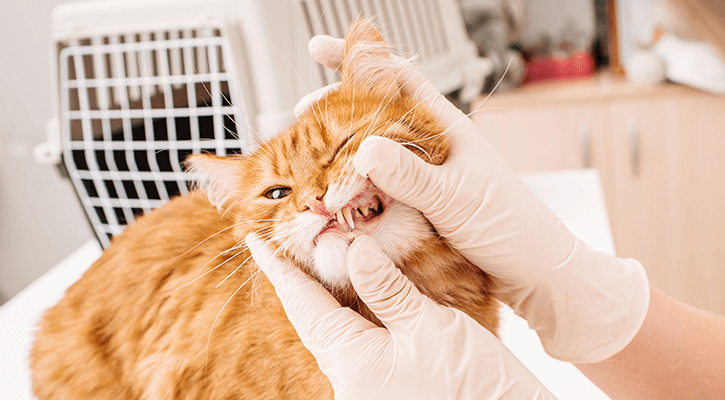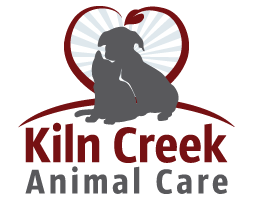Dental Care

Feline Resorptive Lesions
The most common dental disorder diagnosed in cats is tooth resorption, also known as a dental neck lesion. A resorptive lesion can be genetic, or it can occur when an excessive amount of dental tartar and calculus accumulate on the tooth, causing gingivitis and parts of the tooth to resorb, or dissolve. This tartar build-up increases inflammation below the gumline in the lining of the pocket that surrounds the root of the tooth, creating bone loss, similar to a cavity.
A dental radiograph is an important element in diagnosing a resorptive lesion, because it shows the damage to the root that cannot be seen above the gumline. In the radiograph shown below, the premolar mostly to the left shows a “moth-eaten” appearance that is easily seen on the roots, showing resorption. Another finding in these lesions is pulp exposure in an area of the tooth that is resorbing, shown in the picture to the right of the radiograph. This pulp exposure can be very easily seen to the naked eye in most resorptive lesions. The most common treatment is extracting the tooth to not only get rid of the pain for the cat, but also prevent any further periodontal disease and infection spreading to the adjacent teeth and jawbone.
In most cases, the owner will not be aware of this problem without a full oral exam done by the veterinarian. Cats can be very subtle in showing signs that they have any sort of pain or discomfort in their mouth. Sometimes their behavior can change in that they are simply not acting like themselves or hiding in unusual places. More obvious signs are pawing at their face, no interest in food, swelling of the upper or lower jaw, drooling, teeth chattering, weight loss, “bad breath”, or difficulty chewing food.
The ideal way to prevent feline resorptive lesions in your cat is routine oral care at home, including brushing, feeding Feline Dental Health Diet by Purina (we provide samples), or applying an oral gel on the gums daily. Also, complimentary oral exams are recommended between annual visits to keep up with your cat’s dental progress. Another way to prevent this dental disease is by professional dental cleanings, done by a Licensed Veterinary Nurse at Kiln Creek Animal Care. At this time, the nurse will assess your cat’s teeth for any signs of early tooth resorption and set up necessary oral exams.
Cat Dental Care Consultation In Newport News and Yorktown
Thinking your cat could have feline resorptive lesions? Schedule a dental consultation today! Click here to request appointment.
What to Expect During Your Pet’s Dental Cleaning
Dental Care for Puppies and Dogs
Puppies
If possible, get your puppy accustomed to having his/her teeth cleaned on a regular basis a home. Gently rub their teeth with a soft cloth or a child’s soft toothbrush dipped in a solution of baking soda and water. do not use toothpaste formulated for humans. Because pets swallow rather than spit out the preparation, this can cause upset stomach.
Deciduous (temporary) or “milk” teeth begin to appear when a puppy is about four weeks of age, and are lost gradually between 14 and 30 weeks of age. During this time, puppies may eat slightly less and chew more. Rubber toys made especially for puppies are a good investment to help prevent household damage during this time.
Dental Problems
A cracked or broken tooth can be painful if the nerve tissue is exposed; if it becomes infected, there is the danger of the infection spreading through the bloodstream. Prompt veterinary attention is recommended.
Here are some of the common warning signs of dental problems in dogs:
- Loss of appetite
- Red, swollen, or bleeding gums
- Drooling
- Blood in saliva
- Yellow-brown tartar at the gum line
- Broken teeth
- Foul breath
- Reluctant to play with chew toys
However, the most common dental problems dogs experience is buildup from plaque and calculus. If left unchecked, plaque and calculus buildup can eventually cause inflammation of both the gums (gingivitis) and the membrane lining of the tooth socket (periodontitis). Without proper treatment, the teeth may become infected and fall out and the resulting infection may spread to other parts of the body such as the kidneys or valves of the heart.
Dental problems can be minimized or even prevented through regular cleaning and scaling under anesthesia, done by a veterinarian.
Additionally, dry, crunchy foods (such as Purina DH Diet or T/D Canine Dental Health) can be helpful in keeping the teeth clean. As the dog chews, particles from the dry food scrape against the teeth, acting like a toothbrush to help remove plaque.
The most successful means of preventing plaque build up involves routine brushing. It is important to “work-up” to a complete brushing session. Gradually increase the number of quadrants that you brush as well as the number of times a week you brush. We suggest 4-5 times a week to DAILY if possible to make a significant impact on the accumulation of plaque.
Dog Dental Care Consultation In Newport News and Yorktown
Do you think your puppy is experiencing dental health issues? Let us take a look. Click here to request a consultation
Dental Care for Kittens and Cats
Kittens
By four weeks of age, kittens have their incisors, the 12 small teeth in the front of the mouth. At six weeks, all 26 deciduous teeth are in.
Kitten teeth should be white and clean with the upper incisors meeting the lower incisors evenly. The gums and mouth tissue should be pink, or dark pigmented; a pale color is a sign of anemia.
If possible, accustom your kitten to having its teeth cleaned on a regular basis at home. Gently rub the pet’s teeth with your finger. As he/she learns to accept this, use a soft cloth or a child’s soft toothbrush dipped in a solution of baking soda and water or use toothpaste, especially for cats. Do not use toothpaste formulated for humans. Because cats swallow rather than spit out the preparation, this can cause upset stomach.
Occassionally a kitten will retain some deciduous (baby) teeth after the permanent teeth have appeared. This may damage the soft tissues of the mouth and may even accelerate wear of permanent teeth. A veterinarian should be consulted to determine whether or not removal is necessary.
Oral Hygiene
Inspect your cat’s mouth regularly for tartar buildup or a condition of the gums and brush your cat’s teeth with the proper brush and toothpaste (made specifically for cats) once or twice a week. Consult with your veterinarian about the correct home-cleaning process or professional cleaning.
Dry, crunchy foods can be helpful in keeping teeth clean (such as Purina DH Diet or T/D Feline Dental Health ) by scraping against the teeth and acting like a toothbrush to help remove plaque. Still, there is no substitute for regular dental care.
Dental Problems
Lesions on your cat’s gums or foul-smelling breath can be early warning sings of a potential problem. The most common dental problems cats experience result from plaque and calculus buildup. If left unchecked, plaque and calculus buildup can eventually cause inflammation of both the gums (gingivitis) and the membrane lining of the tooth socket (periodontitis).
The infection resulting from these conditions may spread to other parts of the body such as the kidneys or valves of the heart.
Dental problems may also result from injury, foreign bodies such as procupine quills or foxtail, malnutrition, or systemic health conditions that infect the mouth as well as other parts of the body.
Common warning signs of dental problems in cats include:
- Red, swollen, or bleeding gums
- Drooling
- Bad breath
- Loss of appetite/reluctant to chew food
- Dark spots on molars
- Raised sores in mouth
- Chattering or grinding teeth
- Facial swelling (under eyes and jaw)
- Lethargy (loss of energy from not eating)
Kitten Dental Care Consultation In Newport News and Yorktown
Do you think your kitten is experiencing dental health issues? Let us take a look. Click here to request a consultation.
Dental Products
We offer several types of animal dental products that allow you to be proactive and protect your pet’s teeth! Our variety of products range from dental treats and toys to the standard toothbrush and toothpaste! We also stock Hill’s T/D and Purina DH dental diet foods.
We recommend the use of Maxi-Guard OraZn, Vetradent, and Kongs.
We carry C.E.T Veggie Dent chews and Enzymatic Oral Hygiene Chews for dogs as well as Oral Hygiene chews and HEXtra chews for cats. We offer a great variety of treats so you can reward your pets with a healthy diet and healthy teeth!
Do my pet’s teeth need to be brushed?
Dental hygiene in pets is very similar to human dental hygiene. It takes only 36 hours for tartar to turn into calculus. Brushing should be done daily for pets and started at a young age. The majority of pets owners are not aware that this needs to be done and how critical it is.
Brushing your pet’s teeth is a training process and takes patience for both owner and pet. Compliance does not happen overnight! It is important to start slowly and introduce your pet to only the toothpaste. (Remember to use “pet” toothpaste and not “human” toothpaste, which makes them sick). The actual toothbrush can be a strange, foreign object to them at first.
The goal is to make brushing a fun and pleasant experience. You should first allow your pet to lick the toothpaste off your finger for the first few days. Then try moving your finger around in their mouth to get your pet used to the feeling of an object moving across the teeth and gums. After a few days of this, (remember to reward good behavior with treats!) introduce the toothbrush. Let your pet sniff/ Iick the toothbrush for a few more sessions before trying to brush. Start by brushing one area of the mouth at a time (i.e. top right, top left, bottom right, bottom left) for the first week or so.
Your pet will most likely need professional dental cleanings throughout his or her lifetime, but daily brushing can reduce the amount of dental cleanings your pet will need. Brushing can also prevent dental problems that can cause oral infections and possibly surgical extractions of infected teeth. Severe build-up of tartar on teeth causes bacteria to flow through the blood stream, which can lead to heart murmurs and other medical conditions that can shorten your pet’s lifetime. It is essential for dogs and cats to have dental cleanings annually or at least every couple of years, depending on the breed of the animal and of course, the dental care being done at home.
Animal Dental Care Consultation In Newport News and Yorktown, VA
If you think it may be time for a dental cleaning for your pet, or you need help getting started with brushing, call and Make An Appointment with us! We are always happy to help with any dental concerns with your pet!
To Make An Appointment for an animal dental exam or cleaning, call us at 757-886-1300.
